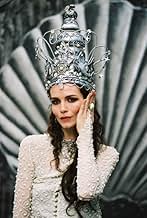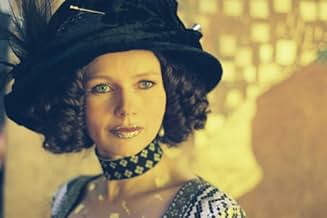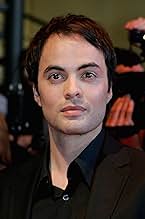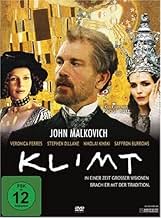A portrait of Austrian artist Gustav Klimt, whose lavish, sexual paintings came to symbolize the art nouveau style of the late nineteenth and early twentieth century.A portrait of Austrian artist Gustav Klimt, whose lavish, sexual paintings came to symbolize the art nouveau style of the late nineteenth and early twentieth century.A portrait of Austrian artist Gustav Klimt, whose lavish, sexual paintings came to symbolize the art nouveau style of the late nineteenth and early twentieth century.
- Director
- Writers
- Stars
- Awards
- 1 win & 4 nominations total
- Director
- Writers
- All cast & crew
- Production, box office & more at IMDbPro
Featured reviews
The other actors are notable European actors whose works have generally not been seen in the United States. The notable German actress Veronica Ferres portrays Emily Floge; Klimt's lifelong companion. Again, unless you are familiar with the life of Klimt the role of Floge in this movie is very difficult to understand. And, it is never explained in the movie. Basically, Klimt and Floge were in-laws by the marriage of Gustav's brother to Emily's sister. The seemed to never have been "lovers" but the unmarried Emily seems to have been a wife (as well as business partner) to Gustav in every other respect. It was a complex relationship and Ferres explains in a side featurette ("The Making of Klimt") the difficulty of showing this relationship. The Austrian actress Aglaia Szyszkowitz portrays "Mizzi"; a model who bore two kids for Klimt of which one is shown- his son Gustav. He never married her, and the movie implies that he saw his kids only occasionally without financially supporting them in any noticeable manner. In real life Klimt did financially support his children by this woman. Of note is that the nickname for Emily Floge was "Middi" and the pronunciation of the two names is very similar; adding to the already considerable confusion.
The movie does portray Klimt in a negative manner concerning his offspring. He acknowledged paternity of four children and the movies deals with the other two as well as the two of Mizzi. Those children are dealt with almost as afterthoughts and one is positively embarrassing (perhaps the ultimate embarrassment). In reality Klimt probably had many more kids and this concern is mentioned briefly in the film. The film is certainly critical of Klimt in this regard; as well as his attitude towards women in general. There are some historical inaccuracies in this film such as a nurse in a Vienna hospital in early 1918 who has a VERY obvious British accent. This is highly unlikely, to say the least, to have been the case considering that the Austrians were in war with the British at that point, but overall the historical settings and costumes are well researched. The movie overall is well researched, but, again, quite confusing to somebody who is not very familiar with the life of this genius. I recommend that anybody who wants to see the film to first read up and look at the artworks of Klimt. Then the film will make sense and be seen as the superb achievement it is.
Gustav Klimt (1862 - 1918) was a strange artist, a man who believed in a sensualist artificial religion and an artist who favored erotic imagery in his canvases. He was controversial in his time, yet today his paintings using gold leaf and silver leaf and design patterns of expression that defined Art Nouveau sell for many millions of dollars: his style is still imitated and he is still celebrated as the father of erotic art. The film opens and closes with Klimt (John Malkovich) submerged in healing waters in a rather stark hospital, attended by a nurse and his disciple, the equally sensational Egon Schiele (Nicolai Kinski, keeping his hands in the spread-finger style Schiele painted so often!). From this point bits and pieces of Klimt's bizarre life are explored, at times explained through imaginary conversations with his secretary (Stephen Dillane). His marriage, his 'affair' - or is it simply a manifestation of the influence of a muse? - with Lea de Castro (Saffron Burrows), his self indulgence in all things erotic (he is said to have has many affairs with Viennese women yielding a large number of children who bear his genetic puzzle), and his conflict with the Academy of Art, a sense of disgust with the current oeuvre of painting as sterile, and his prodigious output of paintings and drawing of the female nude - all are depicted with tremendous imagination here. The cinematography is as strange as the story it captures, using falling snowflakes in one scene to suggest the falling pieces of Klimt's gold leaf enhancement of his most famous works in others.
The dialogue is at times raw and at other times superficial and the audience is begged to indulge in the fantasy that is being recreated. But the film stands well as an example of an art history period and John Malkovich makes a credible Klimt. This is more a film for art students and art lovers who are eager to explore the beginnings of Art Nouveau than a film for audiences eager for accurate biography.
Grady Harp
There's a commonality among those two and Klimt, and even between them and the more cerebral Budapest next generation. Its a matter of passion, sense (in both meanings) and concept curvature. While the two great art nouveau geniuses were wondering about space in Brussels and Barcelona, Klimt worked his space, curvature ans escape from the inside of women. Lots of women.
His work is of that type that is immediately attractive, so lots of people decorate with it. A brief familiarity with it breeds confusion, so unless you dig as deeply in viewing as he did in making, it will not connect. As a result, if you are serious about making a film of him, about him, you simply cannot do the normal thing: somehow artificially inducing drama into portraying a few known events. You cannot do what Greenaway did with Rembrandt, simply showing sexual passion and making the film painterly.
So along comes Ruiz, who is a strange bird, very much like Klimt. There's no middle familiarity with him. Either you know him deeply, you wrap your life where he has, or you miss the passion. You think him dull. You actually believe that someone would spend this much energy fine tuning the ordinary. Well, the thing about these three men is that they were their own worst critics. They all three created their own new worlds were none was before, worlds so perfect and pure anyone of lesser power would be unable to break them. Then they each turned on their own creation, finding and exploiting the weaknesses of their own creations, selves and now us. The art is not in the man but in how he made himself broken.
Look at each of them and see the beauty in partial dismemberment. Ruiz denotes this at the beginning with otherwise inexplicable, powerful amputee sex. As with Ruiz' best work, people act as others, split selves, whores of themselves, auditors and bureaucrats of sex. Love must be dissymmetric. Narrative to have power must be a bit jagged inside, where you want to go.
I admit, I think Malkovich was a bad choice. He really can be dull. But he is supposed to stagger through this, finding puddles of warm light, clean frames or open enclosure. The women are the thing, always the thing here and they are drawn well.
Ted's Evaluation -- 3 of 3: Worth watching.
I didn't like this movie, and I have to say I admire Klimt paintings. I don't think that Klimt was so stiff and also sleepy. There is much more life in one simple photograph from the artist Wiki page, than in this whole movie. All these endless camera rotations around subjects! And too much too loud music... And actually an absence of scenario...
They tried to sell this movie to public - nudes, decadent atmosphere, this misleading label. The ratings show that they failed... I give it 5 for some visual enjoyment I had... and some women hats there were really-really amazing!
Did you know
- TriviaRyan Phillippe was considered for the role of Klimt.
- GoofsWhen Klimt mashes the cake in the man's face, the icing on the man's face is not covering his right eye. In the next close-up shot, there is a large blob of icing covering the man's right eye. In the next long shot when Klimt starts to wipe the man's face, the icing is no longer covering the man's right eye again.
- Quotes
Klimt: Who art thou Asked the guardian of the night From crystal purity I come Was my reply And great my thirst, Persephone Yet heeding thy decree I take to flight and turn, and turn again Forever right I spurn the pallid cypress tree Seek no refreshment at its sylvan spring but hasten on toward the rustling river of Mnemosyne Wherein I drink to sweet satiety And there, dipping my palms between The knots and loopings of its mazy stream I see again, as in a drowning swimmers dream All the strange sights I ever saw And even stranger sights no man has ever seen
- Alternate versionsA 131-minute-long Director's Cut was released theatrically in Austria and is available on DVD in the UK.
- ConnectionsReferenced in Ricardo Aronovich, avec mes yeux de dinosaure du cinéma (2011)
- How long is Klimt?Powered by Alexa
Details
- Release date
- Countries of origin
- Official sites
- Languages
- Also known as
- A Viennese Fantasy à la manière de Schnitzler
- Filming locations
- Production companies
- See more company credits at IMDbPro
Box office
- Gross US & Canada
- $97,656
- Opening weekend US & Canada
- $2,332
- Jun 24, 2007
- Gross worldwide
- $584,991
- Runtime
- 2h 11m(131 min)
- Color
- Sound mix
- Aspect ratio
- 1.85 : 1
























